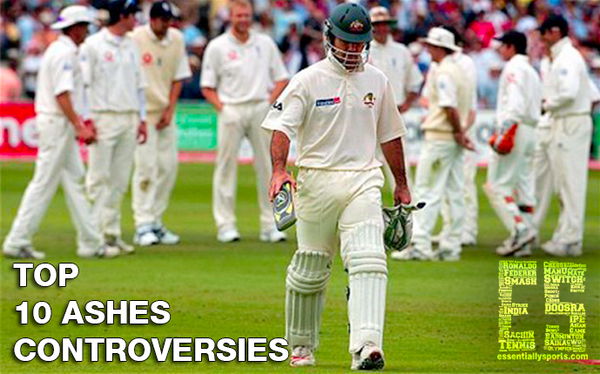
via Imago
Ashes Controversies

via Imago
Ashes Controversies
1) Ponting throws his toys out:

via Imago
Ricky Ponting walks back after being run out by Gary Pratt
The was one of the most (in)famous incidents of the 2005 ashes. The little-known Durham youngster, Gary Pratt found himself on the wrong end of a Ricky Ponting tantrum. All summer, even through the ODI series, England had been using young substitute fielders at crucial stages to try and affect run outs at crucial stages. Moments after replacing the injured Simon Jones in the field, Pratt latched onto a Damien Martyn stab and whipped the ball at the stumps: running Ponting out just two runs short of his half ton and swinging the momentum in England’s favour.
ADVERTISEMENT
Article continues below this ad
Unhappy with what he perceived to be an unfairly high number of substitute fielders during the series, Ponting stormed from the pitch pointing and hurling expletives at the England fielders and as he was walking back to the dressing room. He also directed his ire at Duncan Fletcher who was sitting in the England balcony. He apologized the next day.
As a result, Ponting was relieved of 75 per cent of his match fee.2) Strauss’s time-wasting tactics:

via Imago
Bilal Shifayat and Ricky Ponting in an altercation during the first test.
With tail-enders, James Anderson and Monty Panesar at the crease and needing to cling on, England were accused of deliberate time-wasting by Australian captain Ricky Ponting when opposite number Andrew Strauss twice sent 12th man Bilal Shafayat out into the middle.
Strauss defended his decision. “There was a lot of confusion,” he explained. “We firstly sent the 12th man out to let Jimmy and Monty know there was time left and not just the overs. Then the drinks spilled on his glove and Jimmy called up to the dressing room and we weren’t sure whether we needed the 12th man or the physio – so we sent both out.”
We want to believe you, Andrew. We really do…3) 1979: Lillee shows his metal:

via Imago
Dennis Lillee with his Aluminium Bat
Dennis Lillee is Australia’s third most successful Test bowler of all time with 355 wickets. But his defining Ashes moment came with the timber in his hand. Well, kind of…
At the WACA in Perth, Lillee headed to the crease with an aluminium bat manufactured by a company owned by a personal friend. But when Lillee pinged one away to score three runs, both captains were irked – Aussie skipper Greg Chappell because he thought the ball would have gone for four with a wooden bat, and counterpart Mike Brearly who complained it was damaging the ball.
The stand-off lasted for ten minutes before Lillee threw a tantrum and launched the bat into the air. Following the Test, the laws of the game were amended to state that all bats must be made of wood.4) 2013 Ashes : Stuart Broad doesn’t walk:

via Imago
Aussie fielders appeal as Stuart Broad doesn’t walk
On the third day of the first Ashes Test at Trent Bridge, Stuart Broad clearly edged an Ashton Agar delivery to keeper Haddin, only to be relieved when Umpire Aleem Dar made a horrible (these things happen!) mistake by giving it not out. Australia didn’t have any reviews left, so play went on, much to the frustration of the visibly shocked Aussies. Broad went on to score crucial runs which had a big impact on the game and there was a huge media uproar after Australia ended up losing the test, and Broad’s actions were heavily criticised, with many people saying he should have walked at such a howler.5) Coach Lehmann rants against Broad on radio
.jpg?width=150&blur=15)
When the English returned to defend the Ashes in Aussie land, Coach Darren Lehmann, still early days as national coach , called Stuart Broad a “cheat” in a radio interview, directly pinning an accusation against Broad’s character in public. But bizarrely added he hopes Broad “goes home and cries.”
The Australian coach then went on to encourage the Australian public to “give it to him right from the word go.” This certainly did play a part in large turnouts throughout the summer and the English players constantly copping abuse from fans apart from being picked apart by the Aussies on the field.6) Warner calls Trott “weak”:

via Imago
David Warner and Jonathan Trott shakes hand after the first test at Gabba, Brisbane in 2013
David Warner, no rookie to mind games and banter, created an uproar midway through the first test, when he labelled Jonathan Trott’s dismissal as “weak” at a post-play press conference. Warner’s use of adjectives was severely criticised by the English players, Alastair Cook saying that Trott had played enough cricket and deserved a lot of respect for his achievements on the field of play. Steve Waugh also weighed in, saying Warner’s comments were “completely out of line” and he should let his cricket do the talking.
The issue further heated up when Trott was forced to leave the tour midway due deteriorating stress issues (not related to his on field form). A stunned Warner apologized before all media and had to take back his words, no doubt, with regret.7) Ian Botham and Rodney Marsh Collide:

via Imago
Courtesy: www.cricmatez.com
This is not a controversy as such, but one of the most famous sledges in all of cricketing folklore, one without which no discussion on the Ashes would be complete.
Ian Botham, batting against a rampaging Aussie attack, came up against Rodney Marsh, who asked him “So, how’s your wife and my kids?” Botham curtly gave the timeless reply “the wife’s fine, but the kids are retarded”.8) The Bodyline Series:

England called it “leg theory”; Australia called it “Bodyline” – probably with a few select curse words thrown in. Whoever one sides with, it is easily the most controversial tactic in Ashes, if not in the cricket history. Designed specifically to combat the threat of Australian batting genius Don Bradman, the leg theory involved the ball being bowled toward the body of the batsman in line with the leg stump, in the hope that any deflections would be snaffled by the quadrant of fielders waiting behind square leg.
After witnessing wicketkeeper Bert Oldfield knocked unconscious by a bodyline ball from England’s Harold Larwood, Australian captain Bill Woodfull said: “There are two sides out there. One is playing cricket and one is not.”
English skipper Douglas Jardine did not flinch – mainly because the leg theory had helped lead his side to a 4-1 series win. It was not long before the rules were rewritten to limit the amount of fielders allowed behind square leg – effectively eliminating leg theory bowling for good and returning cricket to the gentlemen’s sport it was designed to be.9. Michael Clarke asks Aleem Dar to not touch him, Oval, 2013
“I remember Aleem touching me and I asked him politely to not touch me because if I touched him I’d be suspended for three matches. That’s all I can remember, coincidentally.”

via Imago
Aleem Dar pushing way Michael Clarke during an Ashes Test.
This is what Michael Clarke had said about his confrontation with Umpire Aleem Dar during the Oval Test in the 2013 Ashes Test Series in England. Michael Clarke had set up the match on the final day with a bold declaration and set England a target of 227 from 40 overs. With the light fading at the Oval, Clarke did not like umpires continuing with the match. According to him, the light was much better in Manchester during the third test of the series when the match was called off.
ADVERTISEMENT
Article continues below this ad
“I think the concern from our players was the reading was taken so late”, said Clarke. “The reading in Manchester was 8.1 and then today it was 5.7 but at the end of the day what do you do? You do your best and try and set up a game and unfortunately home fans (react angrily).”
The match was called off with four overs left and England needing 21 runs to win to clinch the Ashes 4-0.10. English players piss on the Pitch, Oval, 2013

via Imago
A cartoon mocking the english players for urinating on the pitch. Courtesy: http://indiatoday.intoday.in/
While celebrating their 3-0 win over Australia in the Ashes at home, three English players, namely Kevin Pietersen, James Anderson and Stuart Broad were spotted urinating on the pitch by Australian Journalists at the Kia Oval. The incident was out in the open, and Surrey asked the ECB to look into the matter. The players apologized for their behaviour during the celebrations but didn’t confirm the allegations of relieving themselves.
ADVERTISEMENT
Article continues below this ad
Stuart Broad had said, “We got carried away amid the euphoria of winning such a prestigious series and accept that some of our behaviour was inappropriate. If that has caused any offence to anyone we apologise and want to reassure people that it was a simple error of judgment more than anything else.”
ADVERTISEMENT
ADVERTISEMENT
ADVERTISEMENT
ADVERTISEMENT

